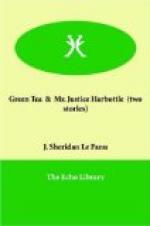“Because he told me so.”
“Not the dead man.”
“Pyneweck told me so.”
“Is that all?” sneered the Judge.
He pondered this matter; and time went on. The Judge was growing a little morose, and less enjoying. The subject struck nearer to his thoughts than he fancied it could have done. But so it is with most undivulged vexations, and there was no one to whom he could tell this one.
It was now the ninth; and Mr Justice Harbottle was glad. He knew nothing would come of it. Still it bothered him; and to-morrow would see it well over.
[What of the paper I have cited? No one saw it during his life; no one, after his death. He spoke of it to Dr. Hedstone; and what purported to be “a copy,” in the old Judge’s handwriting, was found. The original was nowhere. Was it a copy of an illusion, incident to brain disease? Such is my belief.]
CHAPTER VI
Arrested
Judge Harbottle went this night to the play at Drury Lane. He was one of the old fellows who care nothing for late hours, and occasional knocking about in pursuit of pleasure. He had appointed with two cronies of Lincoln’s Inn to come home in his coach with him to sup after the play.
They were not in his box, but were to meet him near the entrance, and get into his carriage there; and Mr. Justice Harbottle, who hated waiting, was looking a little impatiently from the window.
The Judge yawned.
He told the footman to watch for Counsellor Thavies and Counsellor Beller, who were coming; and, with another yawn, he laid his cocked hat on his knees, closed his eyes, leaned back in his corner, wrapped his mantle closer about him, and began to think of pretty Mrs. Abington.
And being a man who could sleep like a sailor, at a moment’s notice, he was thinking of taking a nap. Those fellows had no business to keep a judge waiting.
He heard their voices now. Those rake-hell counsellors were laughing, and bantering, and sparring after their wont. The carriage swayed and jerked, as one got in, and then again as the other followed. The door clapped, and the coach was now jogging and rumbling over the pavement. The Judge was a little bit sulky. He did not care to sit up and open his eyes. Let them suppose he was asleep. He heard them laugh with more malice than good-humour, he thought, as they observed it. He would give them a d——d hard knock or two when they got to his door, and till then he would counterfeit his nap.
The clocks were chiming twelve. Beller and Thavies were silent as tombstones. They were generally loquacious and merry rascals.
The Judge suddenly felt himself roughly seized and thrust from his corner into the middle of the seat, and opening his eyes, instantly he found himself between his two companions.
Before he could blurt out the oath that was at his lips, he saw that they were two strangers—evil-looking fellows, each with a pistol in his hand, and dressed like Bow Street officers.




